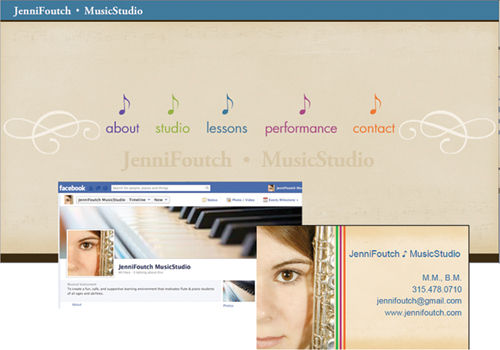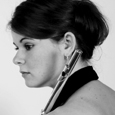When you move to a new city where you know no one, it is easy to feel overwhelmed by the challenges of finding students or jobs to support yourself. Rather than get caught up in the details, focus instead on networking. Next to individual motivation and determination, networking is one of the most important aspects to becoming a successful professional.
As with any field, it really does matter who you know. In his book The Tipping Point, journalist and best-selling author Malcolm Gladwell discusses The Law of the Few where a relatively small number of key people are responsible for championing a trend to the point it tips into the populace at large. It is especially important as flutists, in a niche field, to pinpoint who you should know and then make connections with them. Networking is relationship building. The goal is to nurture new and existing relationships that will benefit both you and the other person.
Your Brand
Before beginning to network in any situation or event, make sure the product is packaged and ready. For musicians the product is their skills, whether as a performer or teacher. Decide where your focus will be; it might be as a performer, a teacher, or both. Once you’ve decided on the package, work on ways to demonstrate your brand. Three simple ways to accomplish this are business cards, hook line, and professionalism.
Business cards are a simple tool to communicate contact information and also demonstrate that you are a serious professional. A sleek, well designed business card is much more professional than a note scribbled on a sheet of scrap paper. To create professional business cards, be sure it includes pertinent information: name, phone numbers, email, website, and perhaps the name of the business or studio. It might even include a list of what you offer. Business cards can leave a lasting impression on new contacts. An attractive, professional card says a lot in a little space. It may be the only physical item you leave with someone to make sure you are remembered past the fleeting moments of superficial discourse.
While creating business cards, start thinking about what your hook line might be. Figure out what to say that will make you stand out from other flutists and music teachers. Try to sum up your goals and mission into one statement. Avoid the basic, “I am a professional flutist and love to teach.” This is a great time to develop a personal philosophy of music if you have not done so already. A hook line that centers on your passion and what you firmly believe will make a much stronger argument to new contacts. For example, although I could describe myself as a professional flutist, performer, teacher, and clinician, that does not necessarily sum up my greatest goals and leave a memorable mark. Instead my personal philosophy can be summed up in the following statement: Music is my vehicle to assist my students in realizing their full potential.
Finally, the key to branding and overall presentation is professionalism. Be professional in everything from dress to unified written documents that help create and integrate the image you want to project. Have business cards, letterhead, a website or at the minimum a Facebook presence. Visual aspects should present a unified appearance. How you act and dress speak volumes about your professionalism and desire for work.

Get Out of Your Comfort Zone
After you create an image for yourself, put your neck out there and meet people. Be confident in your skills and what you have to offer. Believe in yourself and remember that this is what you want, so go get it. Don’t be desperate, remember to smile and focus on relationship building instead of selling.
Target organizations and events. Research what kind of arts related organizations and events are present in the area. Much of the time, the arts are well connected; an art museum may be a great resource. Do not be afraid to go outside the music industry. A business networking event can provide a general feel of the economic and business climate in the community. Organizations such as Kiwanis, the local chamber of commerce, or economic development group can be great resources for connections, referrals and support. Business people who work outside the arts are often well connected and could be a terrific resource or even bring you performing opportunities and students.
Networking Events
• Be early. Make it a point to arrival early, even up to a half an hour. This is a great window of opportunity to start a conversation with others before their friends arrive or groups are formed.
• Be prepared. Have goals in mind. How many connections do you want by the end of the night? Know who you don’t know but want to know.
• Don’t show up clueless. Know about the organization hosting the event. Check their website or call their office for an overview.
• Bring your business cards and hand them out as opportunity presents itself.
• Put your best foot forward and offer your assistance wherever you can. Make the networking time about the people you meet. Help solve their problems first. People will want to help someone who wants to help them or benefit the community.
• Listen. Focus on listening more than you talk. You would be surprised at how many people remember those who actively listen, over those that are the center of attention. A good technique to determine if you are talking too much is to monitor who finishes the meal first. If you finish yours first, odds are that you were listening more than talking. Listening will give you added knowledge of the community. You never know when a piece of information will make all the difference as you continue to network and build a business and reputation in the community.
Auditions and Regional Events
While much of the networking will be done locally, it is also important to make regional and even national connections. Flutists operate in a small niche market, so it is possible, and helpful, to know flute players all over the country. When you take auditions, make a point to introduce yourself and meet fellow auditioners. This not only expands your network, but can help calm nerves. You likely will see them again at other auditions or flute events, so make friends early on.
Additionally, find and attend regional music events. Going to the flute fair two hours away just might make the connection you need. When you go, know what you want to get out of the day: information, new music, or a specific number of contacts.
Whether it is an audition or a regional music event, remember to bring business cards and exude professionalism. How you present and carry yourself expresses more than what you say. Don’t forget a smile either; people are more apt to spend time talking to someone who appears warm and friendly. Never forget that networking is not all about you, but how you can help others too.
Technology is another essential tool. The Nielsen and Pew Research Center has published Internet usage statistics stating that a web user visits over 2,600 websites and logs on 57 times in just one month. Facebook alone has just over 1 billion users who log in to their accounts on a monthly basis. Develop and create a website. Like business cards, the ability to have a professional website says much about you. It can quickly communicate your goals and what you have to offer. An unprofessional or confusing site may say the opposite. When you meet or hear about a likely contact, send out an email icebreaker. It is like going up to someone to shake a hand. Be friendly, professional, and concise in your email. Get to the point, emails are easy to send but also easy to ignore. Create a Facebook and Twitter presence. It will help you make connections and create a brand.
Follow Up
The hardest part is over, but don’t let all that work go to waste. A strong follow up is the only way to really make good use of time spent networking. This is the simplest but most commonly overlooked facet to networking and relationship building.
If you attend a fellow musician’s concert, send a note or email to express how much you enjoyed the evening. Pull out those mental notes you took at a community arts event and shoot a new contact an email discussing some of the main points of interest or asking a follow up question that might lead you to more information. Pick up the phone and schedule a lunch date with the non-profit president of XYZ Music Organization to see where you might fit in or how they can help you. People are generally willing to help, but it is up to you to keep the communication lines open.
Keep It Up
Finally, don’t stop with one or two events or individuals. Stay up-to-date on community events and organizations. Get out there. Be willing to shake hands, put on a smile, and be gregarious. Ask questions. Educate yourself. Don’t be afraid to ask for specific contacts and who to call. Most likely, that person has been in your shoes and knows how difficult it can be to establish connections and a helpful network. It takes time and effort to continue networking, but the more you put in to it, the better off you will be in the end. Zig Ziglar, a well-known expert on sales, equates networking and prospecting to working an old hand water pump. The user must first prime the pump and then vigorously pump if they are to expect the reward of a cool drink of water. Don’t give up if the pumping seems to be taking too long. Who knows, the water, or the rewards from your networking might be just inches away.
Networking is essential for any musician who desires professional growth and opportunities. It can be intimidating to know where to begin, especially if you find yourself in a new city. I used these techniques in two very different cities. I first established myself in Greensboro, North Carolina, and then just as I was getting settled there, I had to move to Syracuse, New York, a city where I knew absolutely nobody. In both circumstances, my studio and opportunities were growing within months thanks to determination, motivation, and networking.
Don’t overlook the power of networking. It is up to you to meet new contacts and develop relationships. Not everyone is an extrovert who is comfortable networking, but it is possible to be successful if you act confident, friendly, knowledgeable, and determined. The more you network, the easier it gets.






